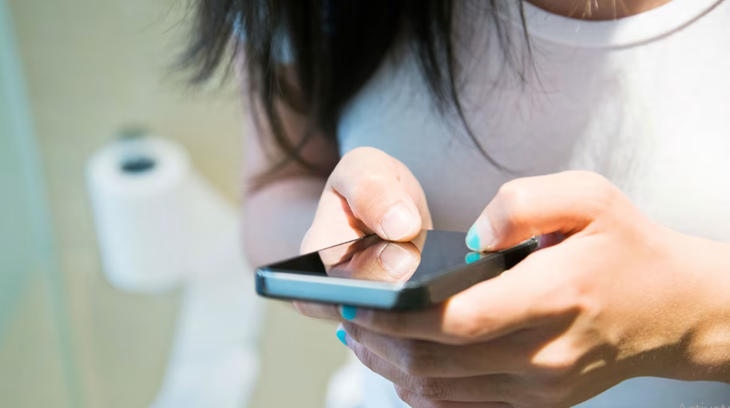A new study shows that people who have the habit of bringing their phones into the bathroom have a 46% higher risk of developing hemorrhoids compared to those who do not.
A new study published in the journal PLOS One states that people who have the habit of using their phones while in the bathroom have a 46% higher risk of developing hemorrhoids compared to those who do not.
This study was conducted on 125 people aged 45 and older during colorectal cancer screening colonoscopies, while also surveying their diet, level of physical activity, and bathroom habits, including time spent sitting on the toilet and conditions like constipation or straining.
The results showed that two-thirds (66%) admitted to bringing their phones into the bathroom, primarily to browse news and social media. After excluding common risk factors such as advanced age, lack of exercise, and low fiber intake, the group that used phones in the bathroom had a 46% higher risk of hemorrhoids compared to the group that did not.
Among them, more than one-third (37%) sat in the bathroom for over five minutes, while only 7% of the group without phones did so.
A gastroenterologist explained that sitting for long periods increases pressure on the anal tissues, which over time can lead to weakened connective tissue and the formation of hemorrhoids.
“If you haven’t had a result within five minutes, stand up, take a break, and then come back,” she emphasized.
She also compared reading newspapers or magazines in the past, which were less distracting, to current platforms like TikTok and Instagram. Social media apps make users more likely to lose track of time, prolonging their sitting duration.
She further warned that in an ongoing study with university students, almost all admitted to bringing their phones into the bathroom, raising concerns that younger generations might develop hemorrhoids earlier in life.
It is estimated that hemorrhoids affect about 25% of adults, but many are too embarrassed to talk about it. In the UK, more than 20,000 people undergo surgery for this condition each year.
Although the study results are still preliminary, the research team advises people not to bring phones into the bathroom, or at least set a time limit for browsing to avoid distraction and sitting for too long.
For those who “cannot live without their phone” even when using the toilet, the doctor recommends: “Set a limit for yourself—only two TikTok videos. Don’t let yourself get caught in an endless cycle of browsing and watching TikTok, forgetting the real reason why you are sitting there.”
On Earth, liquid water is always considered the key to life. But on distant planets, that may not necessarily be the case, according to new research from the Massachusetts Institute of Technology.






